|

|
LIFE AFTER
SOUTHCOM (Continued)
Served with Headquarters, U.S. Southern
Command (in Panama or, since October 1997, in
Miami), Its Predecessor Commands in Panama, or Its Component Commands
(Those who served in Panama
denoted in black / Those who served elsewhere since
1997denoted in blue)
| Hartzog,
General William W. (U.S. Army retired) (Director, of Southern
Command's J-3/Operations 1989-1990; Commanding General of Army South
as major general 1990-1991; earlier assignments in Panama as
Lieutenant Coronel in late 1970s-early 1980s as commander of 3rd
Battalion, 5th Infantry at Fort Kobbe, later director of
G-1/Directorate of Personnel and Community Affairs of the 193d
Infantry Brigade (Panama),which was then Southern Command's Army
component command) after leaving Panama he commanded the 1st
Infantry Division at Fort Riley, Kansas; later was Deputy
Commander-in-Chief of the US Atlantic Command in Norfolk, Virginia
1993-1994; and was Commanding General of the Army's Training and
Doctrine Command (TRADOC) in Fort Monroe, Virginia 1994-1998;
retired in 1998. Since retirement, he has been President and
Chief Operating Officer of Burdeshaw Associates, Ltd., a consulting
firm in Bethesda, Maryland, and a member of the Defense Science
Board. |
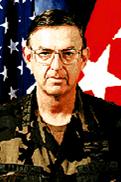
William Hartzog |
| Joulwan,
George A., General (U.S. Army retired) (Commander in
Chief, U.S. Southern Command November 1990 - November 1993)
served as Supreme Allied Commander, Europe (SACEUR)-North Atlantic
Treaty Organization (NATO) and Commander in Chief European Command
November 1993 - July 1997. Under his leadership, NATO prosecuted the
war in Bosnia in 1996 and the NATO-led Peace
Implementation Force. For eighteen
months he was the overall military commander of the Implementation
and Stabilization Force involving thirty-six nations. He was
instrumental in developing the Partnership for Peace Program, and
due to his efforts and initiative, Russian and United States
military forces conducted operations together in Bosnia. This
cooperation, spearheaded by Joulwan, was the basis for the historic
NATO-Russian Founding Act signed in 1997 that ended the Cold War.
Since retirement, Joulwan served as an advisor to private industry,
a consultant in both the public sector and on senior defense boards,
and as a teacher and educator, including the Olin Professor for
National Security at the United States Military Academy. He
is an Executive Director with The Steele Foundation, a multinational
firm providing a broad range of specialized risk management services
to government, and a member of Steele's Executive Advisory Board.
He is
also a CNN military analyst, particularly on the wars in Afghanistan
and Iraq. |

George Joulwan
|
| Kamiya,
Major General Jason K. (U.S. Army) (Special Assistant to Air
Force Brigadier General Antonio Ramos, Special Assistant to
SouthCom Commander in Chief for post-1999 presence in Panama
negotiations in the mid-1990s) later
was Commanding General, Joint Readiness
Training Center and Fort Polk, Fort Polk, Louisiana; then Commanding
General of the Hawaii-based 25th Infantry Division; then
Commanding General, United States Army Southern European Task Force
(Airborne), Italy. In February 2006 he ended a year assignment in
Afghanistan as Commanding General of Combined
Joint Task Force 76, the 18,000-strong U.S.-led coalition there and
returned to his assignment in Italy. In Since May 2006 he is
director of joint training for the Joint Warfighting Center and the
Joint Forces Command, Suffolk,
Virginia. |
|
| Kensinger,
Lieutenant General Philip R., Jr. (U.S. Army retired) (Commanding General of U.S. Army
South in Panama June 1997-1999 and took USARSO to Fort Buchanan,
Puerto Rico in 1999; earlier assignments in Panama as executive
officer, 3rd Battalion, 7th Special Forces Group, Fort Gulick, later
commander, Special Forces Battalion Task Force, Joint Task Force-11,
Honduras), later was Chief of Staff of the U.S. Army Special
Operations Command at Fort Bragg, NC; Deputy Commanding General of
U.S. Central Command; Army’s Deputy Chief of Staff Operations/G-3;
and in Aug 2002 became Commanding General, U.S. Army Special
Operations Command at Fort Bragg, N.C.. He retired from the
Army in early 2006. |

Philip Kensinger |
| Kinzer,
Brigadier General / Lieutenant General Joseph W. Kinzer (U.S. Army retired) (Deputy commander of U.S. Army South in
Panama under then Maj. General Marc Cisneros; then as brigadier
general commanded U.S. Army South July- September 1990) in
1993 commanded the U.S. Army Special Operations Agency at the
Pentagon as a major general; in 1993-1994 was deputy commanding
general of Fifth Army at Fort Sam Houston, Texas (under Lieutenant
General Marc Cisneros); 1995-1996 commanded the United Nations
Mission in Haiti (UNMIH) forces; was promoted to lieutenant general
and assigned as commanding general of Fifth Army at Fort Sam
Houston, Texas. 1996- July 1998, succeeding Cisneros. |
|
| Lehnert,
Major General Michael R. (USMC) (Chief of Staff of United
States Southern Command, Miami, Florida, 2004-2005 - his last
assignment with SouthCom; promoted to major general in 2005) is
currently Commanding General, Marine Corps Installations West/Marine
Corps Base Camp Pendleton,California. In 2003, he deployed
with the Marine Corps' 2d Force Service Support Group (which he had
commanded in 2001) to the U.S. Central Command theater and
participated in Operation Iraqi Freedom as Commander, Marine
Logistics Command. (Other assignments with SouthCom were
1988-1990 as a major in the J-3 Operations Directorate as Chief,
Central American Exercise Branch including participating in
Operations Just Cause and Promote Liberty; in 1995 with 2d MAW he
was Commander, Joint Task Group Bulkeley, JTF 160 where he commanded
the security forces responsible for operation of Cuban and Haitian
migrant camps (Operation Sea Signal);
in 1999 deployed to Panama as the Chief of Staff, Joint Task Force
Panama to oversee the final turnover of the Panama Canal and the
remaining military bases; in January 2002, he deployed to Guantanamo
Bay, Cuba as Commander, Joint Task Force 160 (under SouthCom) whose
mission was to construct and operate the detention facilities for
Taliban and Al Queda detainees.) |
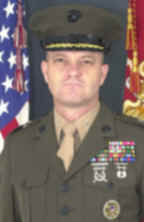
Michael Lehnert
|
| Lejeune,
Major / Lieutenant General John A. (USMC retired-deceased) (In
fall 1903 dispatched to Panama as commander of the Marine battalion
when conditions had become critical through the revolution against
Colombia and departed Panama December 21, 1904, and returned as
commander of a battalion of Marines May 29 - July 6, 1906 at Camp
Elliott in the Panama Canal Zone as detached duty) -- Assignments
since leaving Panama included Philippine Islands, Cuba, Vera Cruz,
Mexico, commanded the Marine Barracks,
Quantico, Virginia, commanded the Second Army Division (1918 - 1919,
the only Marine to have commanded an Army Division), the thirteenth
Commandant of the Marine Corps (1920 - 1929), and retired in
1929. He was advanced to lieutenant general on the Marine
Corps retired list in 1942. Camp Lejeune, North Carolina, was named
after him. |
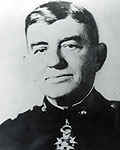
John A. Lejeune |
|
Leuer, Major
General Kenneth C. (U.S. Army retired) (Commanding General,
193d Infantry Brigade (Canal Zone), Fort Amador (June 1979 - Sept
30, 79) and Commanding General, 193d Infantry Brigade (Panama), Fort
Clayton (Oct 1, 1979 - April 1982) was later Assistant
Commandant, U.S. Army Infantry Center; Deputy Chief of
Staff-Operations, C-3, J-3, G-3, Korea;
Commanding General, 5th Mechanized Division, and Commanding
General/Chief of Infantry, U.S. Army Infantry Center at Fort Benning,
Georgia. Upon retirement from
active service in 1988, he became the President/CEO of Goodwill
Industries until 1999. He is currently Chairman of the Ranger
Memorial Foundation, Inc., a non-profit organization dedicated to
recognizing U.S. Army Rangers, past, present, and future. (He had
activated and organized the 1st Battalion, 75th Rangers. He was a
Charter Inductee into the Ranger Hall of Fame.) |
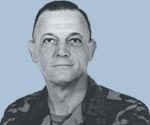
Kenneth C. Leuer |
| Loeffke,
Major General Bernard (U.S.
Army-retired) (Commanding General, U.S. Army South (USARSO), Fort
Clayton, April 1987 - June 1989) was later chairman
of
the
Inter-American Defense Board
and
military advisor to the Secretary
General
of the Organization of
American
States; he retired from the Army in 1992.
He was
recalled to serve as the
Director
of Task Force
Russia
in
its
mission of investigating and
resolving
questions regarding
U.S.
prisoners of
war and Missing in Action in the old Soviet
Union. (Fluent in Russian language with a Masters
degree in Russian and Soviet Area Studies, he had served earlier as
the Army Attaché in Moscow after
having served as Chief of the Military Mission in the
Peoples
Republic
of
China.)
That POW-MIA assignment led
him to visit many labor camps in Siberia,
and testify before Senate committees on his findings. In 1997,
he earned a Physician’s Assistant degree from Nova Southeastern
University and has since participated in humanitarian medical missions in Afghanistan,
Cambodia,
China,
Dominican
Republic, Guatemala,
Guyana,
Haiti, Sudan
and
Vietnam,
and teaches public health, emergency medicine and mediation
as a visiting professor at two medical universities. In 2007.
the Association of Graduates of the United States Military Academy
presented him the 2007 Distinguished Graduate Award. |
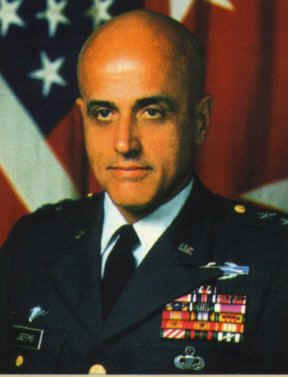
Bernard
Loeffke |
| McAuliffe,
Lieutenant General Dennis P. (U.S. Army retired) (Commander
in Chief, U.S. Southern Command 1975 – Sept 1979)
was appointed the first Administrator of the bi-national Panama
Canal Commission (created by the Panama Canal Treaty signed in 1977)
on October 1, 1979, by President Jimmy Carter and served in that
position until September 30, 1989. |

D. P. McAuliffe
|
| McCaffrey,
General Barry R. (US Army retired) (Commander in Chief, U.S.
Southern Command Feb 1994 – Jan 1996; his first assignment in
Panama was aide-de-camp to Major General C.L. Johnson, commanding
general of U.S. Army Forces Southern Command in 1968), retired
from the Army upon leaving Panama and was Director of the Office on
National Drug Control Policy Jan 1996 - Jan 2001,
appointed to that position by President Clinton. As the
Drug Czar, he coordinated a $19 billion federal drug control budget
and developed the U.S. National Drug Control Strategy and served as
a member of the President’s Cabinet
and the National Security Council for drug-related issues.
McCaffrey is President of his own
consulting firm based in Arlington, Virginia (www.mccaffreyassociates.com).
He serves as a national security and terrorism analyst for NBC News
and writes a column on national security issues for Armed Forces
Journal. He is also an
Adjunct Professor of International Affairs at the United States
Military Academy at West Point, NY and was the Bradley Distinguished
Professor of International Security Studies at West Point Jan.
2001-May 2005.He is Board Chairman of HNTB Federal Services, a preeminent U.S.
engineering and architectural
design firm, and on the Board of Directors of DynCorp International,
CRC Health Corporation, McNeil Technologies, The Wornick Company,
Phoenix House Foundation and the Atlantic Council of the United
States. He is a member of the Council on Foreign Relations; an
Associate of the Inter-American Dialogue; a Principal for the
Council on Excellence in Government; a member of the CSIS
U.S.-Mexico Binational Council; Chairman of the Vietnam Veterans
Memorial Education Center Advisory Board; a Senior Executive
Associate for Army Aviation Association of America and is a member
of the Board of Advisors of the National Infantry Foundation.
McCaffrey is active in national security affairs. He co-chaired
the Atlantic Council of the United States NATO Counterterrorism
Working Group, leading a delegation to Moscow, Mons, Brussels and
Warsaw. In 2004 he addressed the
"Security of the Americas Conference" in Mexico City and
met with senior officials of the Mexican Government. In April 2004,
General McCaffrey helped release the CSIS Bi-national Commission
Reports on Migration and Border Security. He visited Iraq in 2004
and 2005 to conduct a country-wide analysis of the security
situation and again in 2006, Afghanistan and Pakistan 2004 and 2005
to conduct a political-military assessment and also in 2006, Cuba in
2002 where he participated in a small group session with Fidel and
Raul Castro discussing U.S.-Cuba policies., and Guantanamo Bay in
Cuba in 2006. (His after action reports on all these trips are
available at www.mccaffreyassociates.com.) |

Barry McCaffrey
|
| Magruder, Major General
Lawrence W. III (U.S. Army retired) (Commanding General, U.S. Army South
1995-1997) was Commanding General of the Army’s 10th
Mountain Division (1997-1999) and Deputy Commanding General and
Chief of Staff of U.S. Forces Command at Fort McPherson, Georgia
(1999-2001) with promotion to lieutenant general. Since
retiring from the Army in July 2001, he was vice president for national security programs for Battelle
Memorial Institute where he developed the Battelle Office for
Homeland Security and later executive director of the Institute
for the Protection of American Communities
(IPAC), created by the University of Texas at San Antonio. He was
inducted into the Ranger Hall of Fame in June 2008.
|
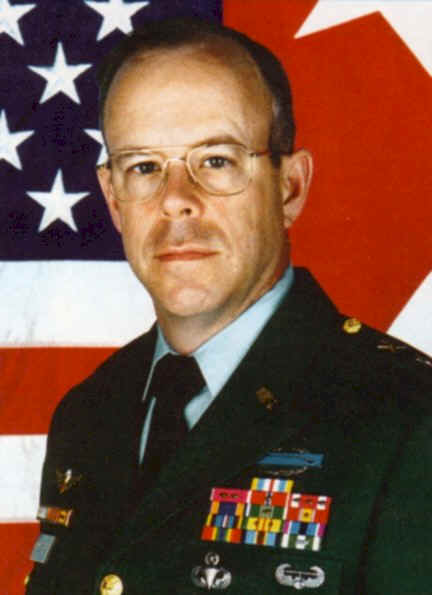
Lawrence Magruder |
| Navas,
William (commanded the first Army National Guard engineering
unit deployed to Latin America for road/bridge building exercise in
January - May 1984) was appointed Assistant Secretary of the
Navy for Manpower & Reserve Affairs in 2004. In 1984, he
commanded the joint task force (primarily units from the Puerto
Rico’s Army National Guard 92nd Infantry Brigade
(Separate) which conducted the first road and bridge building
exercise in Panama (and the first such exercise conducted in Latin
America) January-May 1984 in Veraguas Province. Later, he was Deputy
Director of the Army National Guard (1987 – 1990), Vice-Chief of
the National Guard Bureau (1990 – 1992), Military Executive for
the Reserve Forces Policy Board (1992 – 1994), Deputy Assistant
Secretary of Defense and Chief of Staff for Reserve Affairs (1994
– 1995), and Director of the Army National Guard of the United
States (1995 – 1998). |

William Navas |
| Nutting,
Lieutenant General Wallace H. (U.S.Army-retired)
(Commander-in- Chief, U.S. Southern Command Oct 1979 - May 1983) served
as Commander in Chief, United States Readiness Command (USCINCRED) from 1983 to 1985. Following retirement from the Army in 1985 he
settled in Biddeford, Maine where he served as mayor from 2003-2007.
He
also served as a Senior Fellow at the Institute of Higher Defense
Studies at the National Defense University and is an Associate
Fellow at the Center for International Affairs at Harvard
University. He was chairman of the University of Southern Maine's
Senior College board. In May 2008, he received the West Point
Distinguished Graduate Award from the academy's Association of
Graduates in a ceremony at West Point.
|

Wallance
Nutting |
| Pace,
Peter General (Marine Corps) (Commander
in Chief U.S Southern Command in Miami (Sept 2000 – Sept 2001) was
the 16th Chairman of the Joint Chiefs of Staff September 2005 -
October 1, 2007. Pace was the first
Marine to serve in that position which is the senior military
adviser to the President, the Secretary of Defense, and the National
Security Council -- thus the Nation's highest ranking military
officer. He previously was Vice Chairman of the JCS September 2001 -
September 2005 (also the first
Marine to serve in that position). He retired October 1, 2007,
after 40 years of military service, beginning in Vietnam. [For
earlier assignments go to] |
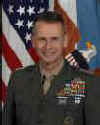
Peter Pace |
| Pagonis,
Lieutenant General William "Gus" (U.S. Army retired)
(Director of Logistics, 193d Infantry Brigade (Panama), Corozal,
Panama, early 1980s, including serving as acting chief of staff,
193d Infantry Brigade (Panama) briefly in 1981) retired from the
Army in 1993 after his last assignment as Commanding General, 21st
Theater Army Area Command, U.S. Army Europe. Prior to that he was
Commanding General, 22nd Support Command, Saudi Arabia, responsible
for all logistical operations during Desert Shield/Desert Storm. As
chief logistician during the Gulf War, he successfully masterminded
logistics for the Gulf War, for which he was promoted to lieutenant
general and won high praise from General Norman Schwarzkopf. From
1993 to 2004, he was president of Sears Logistics Services, a
division of Sears Roebuck and Company and senior vice president for
Supply Chain for Sears, Roebuck and Company, where he was
responsible for all of Sears’ supply chain functions, including
transportation, distribution, international logistics, home-delivery
services, inventory and the integration of logistics information
services. Since mid 2004, he has been chairman of the board at
RailAmerica Inc., the world's largest short line railroad and vice
chairman of the board for Genco—a logistics service company that
specializes in reverse logistics. Pagonis also chairs the volunteer
Department of Defense Business Board, established by Secretary of
Defense Donald Rumsfeld to encourage the sharing of ideas among
private sector companies and the military. |

William Pagonis
|
| Peabody,
Brigadier General John W. (Political-Military Division Chief
of the J-5Directorate, U.S. Southern Command in Panama in the 1990s;
his first military assignment was with the 193rd Infantry Brigade in
Panama in the early 1980s where he served as a Sapper Platoon
Leader, Company Executive Officer, and later Aide-de-Camp to then
Brigadier General Frederick Woerner, commanding general of the 193rd
Infantry Brigade (Panama); later he was an Instructor at the U.S
Army School of the Americas at Fort Gulick, Panama) was promoted
to Brigadier General in late 2005 while commander, U. S. Army
Engineer Division, Pacific Ocean at Fort Shafter, Hawaii. In 2005 he
is Pacific Ocean Division Commander and Division Engineer.
(Assignments between SouthCom and Army Engineer Division-Pacific
Ocean included Commander of the 299th Engineer Battalion, 4th
Infantry Division at Fort Hood; and Senior Engineer Trainer,
Operations Group, at the National Training Center. During Operation
Iraqi Freedom he commanded the 3rd Infantry Division’s Engineer
Brigade totaling over 3,000 engineers with ten attached units. Prior
to reporting to Hawaii, he was assigned to Program Division
Chief in the Army’s Office of the Chief, Legislative Liaison.) |

John Peabody |
| Perez,
Gilberto R, Colonel (Chief
of Staff of
U.S. Army South at Fort Sam Houston,
the Army component of U.S. Southern Command, 2005-2006, with
previous assignments
in South and Central America, including serving as an instructor at
the U.S. Army School of the Americas at Fort Gulick, Panama, in
1979-80 and 1983-84) assumed command of the Western Hemisphere
Institute for Security Cooperation at Fort Benning, Georgia, March
2006. |
|
| Richardson,
General William R. (U.S. Army retired) Commanding
General of 193d Infantry Brigade (Canal Zone)--then the Army
component command of the U.S. Southern Command -- Dec 1974 - June
1977)
was Director of Requirements on the Army Staff 1977 - 1979, where he oversaw the
Army’s requirements for weapons and equipment systems; Deputy Chief of
Staff for Operations and Plans, at Headquarters, Department of the
Army as a lieutenant general 1981 -1983, where he was involved in operational planning,
force developments, security assistance, and arms control; and Commander of the
Army’s Training and Doctrine Command (TRADOC) from 1983 to 1986.
As the TRADOC Commander, General Richardson developed an extensive
dialogue with Industry and was successful in creating an environment
for participation by TRADOC, Army Materiel Command (AMC), and Industry in Army combat and
material developments. He was responsible for the establishment of
several new agencies and departments at Fort Leavenworth. Believing
that the heart of the Army was TRADOC, and the heart of TRADOC was
Fort Leavenworth, he continued development of the School for
Advanced Military Studies, created the School for Professional
Development, the Center for Army Leadership, Combined Arms Training
Activity, the Center for Army Lessons Learned, and the Combined Arms
Operational Research Activity. A final significant reorganization
was his idea to transform the Deputy Chief of Staff for ROTC into
the ROTC Cadet Command as a major subordinate command of TRADOC. Later, he was the first recipient of the
Franklin Delano Roosevelt Award, given every three years by the
Society for History in the Federal Government to the official who
has done most to promote the use and preservation of history in the
federal sector. Upon retiring from the Army in 1986 he joined Burdeshaw Associates, Ltd.
(BAL) as Executive Vice President, Army Programs. In 1995, he
resigned from BAL as a full time employee but remained Senior
Associate. |
|
| Ridgway,
Matthew B., General (U.S. Army retired-deceased) (Commander-in-Chief,
U.S. Caribbean Command (U.S. Southern Command’s predecessor
command), June 1948 – October 1949 as a lieutenant general; earlier
served in Panama in 1931-1932 as a major with the 33rd
Infantry Regiment at Fort Clayton) was Supreme Allied Commander
Far East (1951-52) succeeding General Douglas MacArthur, Supreme
Allied Commander Europe/NATO (1952-53), and Chief of Staff of U.S.
Army (1953-55). He was Chairman of the Inter-American Defense
Board 1946-1948. |
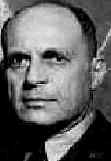
Matthew Ridgway
|
| Sanchez,
Lieutenant General Ricardo S. (U.S. Army retired) (Was Deputy
Chief of Staff at U.S. Southern Command in Panama as colonel
1994-1996 and Director of SouthCom's J3/Operations Directorate in
Panama and Miami 1996-1998) was Commanding General of the V
Corps in Germany June 2003 - August 2006, followed by retirement
from the Army in November 2006. Concurrently, he was Commanding
General of all the coalition ground forces in Iraq (CJTF-7) June
2003 - June 2004. Previous assignments since leaving SouthCom in
Miami were Assistant Division Commander (Support) of the 1st
Infantry Division, U.S. Army Europe and Seventh Army, Germany;
Commander of NATO’s Multinational Brigade Force, Kosovo November
1999 – May 2000, then Commanding General of V Corps' 1st
Armored Division 2001 - 2003. Sanchez held the top military position
in Iraq during what was arguably one of the most critical periods of
the war--the year after the fall of the Hussein regime, and the time
the insurgency took root and began its counterattack. Highlights
during his tenure as commander in Iraq include the killing of Uday
and Qusay Hussein and the capture of Saddam Hussein.
Although Sanchez had been exonerated
in 2005 in official investigations by the Army and the Department of
Defense of the Abu Ghraib prison scandal and the controversy over
interrogation techniques both which occurred during his command, his
nomination for a fourth star and command of the U.S. Southern
Command in Miami was quietly withdrawn in 2004 when it became
apparent that hearings on Capitol Hill on his promotion would
dissolve into a firestorm over Pentagon and White House
interrogation policies and would sink his confirmation, according to
news media reporting. Sanchez
relinquished command of V Corps in a ceremony in Germany early
September 2006 and retired from the Army in a ceremony at Fort Sam
Houston, San Antonio, Texas, November 1, 2006 (For
more, GO
TO; also GO
TO on his not getting SouthCom's commander-in-chief
post in 2004.) |
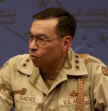
Ricardo Sanchez |
| Sconyers,
Brigadier General Ronald (U.S. Air Force-retired) -- Director,
Southern Command Public Affairs Directorate, Quarry Heights
(1987-Jan 1990); Director of public affairs, Headquarters
Tactical Air Command and Headquarters Air Combat Command
(1990-1992); Commander, 363rd Support Group, Shaw Air Force Base
(1992-1994); deputy director, public affairs, Office of the
Secretary of the Air Force; director, public affairs, Office of the
Secretary of the Air Force (1994-1998). |
|
| Smullen,
Colonel F. William "Bill" III (U.S.
Army retired) (community
relations officer with the Southern Command Directorate of Public
Affairs at Quarry Heights early-mid 1980s) has since been Chief
of the Army Public Affairs Media Relations Division when interaction
with the civilian press was frayed and trust was nearly nonexistent
and nearly five years later he had turned the climate 180 degrees;
later was the Special Assistant for Public Affairs to two Chairmen
of the Joint Chiefs of Staff --Admiral William Crowe in 1985-1989 and
his successor General Colin Powell Sept 1989-1993. After retiring
from the Army, he became the
Executive Assistant to General Powell, assisting with the writing
and promotion of his autobiography, “My American Journey,”
published in 1995 and managing the General’s private office and
professional activities; 2001-2003 he was Chief of Staff to
Secretary of State Colin Powell and of the U.S. Department of State;
since 2003 he is director of the
National Security Studies program at the Maxwell School of
Citizenship and Public Affairs at Syracuse University and also
Maxwell’s Senior Fellow in National Security and a member of the
faculty of Syracuse University’s S.I. Newhouse School of Public
Communications as a Professor of Public Relations. |
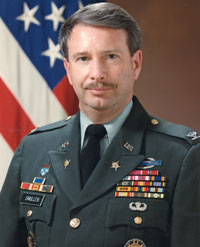 William
Smullen |
| Speer,
Lieutenant General Gary D. (U.S. Army) (former deputy commander of
U.S. Army South 1996-1998 in Panama and deputy
commander in chief of U.S. Southern Command in Miami 2000-2002)
-- Assistant Division Commander-Operations of the 10th
Mountain Division 1998-2000 including having commanded the Coalition
Joint Task Force Kuwait (Forward) in 1999; Deputy Commanding
General, Third U. S. Army,
Fort McPherson, Georgia (2004-2005) including Deputy
Commanding General, Third U.S. Army at Camp Doha,
Kuwait in 2004; was promoted in late 2005 to lieutenant
general and assumed in April 2006 duties of Deputy Commanding
General, U.
S. Army Europe and Seventh Army, Heidelberg, Germany. |

Gary Speer
|
| Timmons,
Lieutenant General Richard F. (U.S. Army retired) (Commanding General, U.S. Army
South (USARSO), Fort Clayton July 1991 - May 1993) since
leaving Panama had been Commander of the 7th Light Infantry
Division; Deputy Commander of the 82d Airborne Division at Fort
Bragg, N.C.; and Commander of the Eighth United States Army in Korea
and concurrently Chief of Staff of the United Nations Command,
Combined Forces Command, and U.S. Forces in Korea. After retiring
from the Army, he entered the rail industry in 1997 and, since 2002,
is president of the American Short Line and Regional Railroad
Association, headquartered in Washington, D.C. He was named 2006
Railroader of the Year by railroad industry trade journal Railway
Age, one of the most prestigious in the railroad industry. |
|
|
Vaughn, Lieutenant
General Clyde A. (Army National Guard) (served in various assignments with the U.S. Army in Panama for
some nine years from 1984 through 1997) is
Director of the Army National Guard, National Guard Bureau,
Arlington, Virginia, since 2005. Previously, he was Assistant
to the Chairman of the Joint Chiefs of Staff for National Guard
Matters; earlier, deputy director, Army National Guard; deputy
director for Operations, Readiness and Mobilization, Office of the
Deputy Chief of Staff, G-3, U.S. Army. (His assignments in
Panama began in December 1984 as operations officer, 135th
Engineer Group, with the six-month BLAZING TRAILS road and bridge
building exercise by the Army National Guard in Veraguas Province;
followed by exercise officer with the 193rd Infantry Brigade
(Panama)/U.S. Army South 1985-1988; operations officer with Abriendo
Rutas (Opening Roads) Exercise in Ecuador and U.S. Army South in
Panama; from 1990-1991 he was commander of Task Force 354 which
conducted Fuertes Caminos year-long series of engineering projects
throughout Panama; 1994-1995 Deputy Chief of Staff for Reserve
Affairs/National Guard, United States Army South, and Special
Assistant for Reserve Affairs United States Southern Command; and
1995-Nov 1997 Commander, Exercise Support Command and Deputy Chief
of Staff for-Reserve Affairs/National Guard, United States Army
South.
|

Clyde Vaughn |
| Wilhelm,
General Charles E. (Marine Corps retired) Commander, U.S.
Marine Corps Forces, South (dual-hatted
as Commander, U.S. Marine Corps Forces, Atlantic/Commanding General,
Fleet Marine Force, Atlantic/ Commander, U.S. Marine Corps Forces,
Commanding General, II Marine Expeditionary Force/Commanding
General, Marine Striking Force Atlantic, Camp Lejeune, N.C.)
(Aug 1995 – Sep 1997) and Commander-in-Chief, U.S. Southern
Command (Sep 26, 1997 – Sep 2000). After retiring from the
Marine Corps, he joined Battelle, one of the
world's largest independent, nonprofit research and development
organizations, as Vice President and Director of Battelle's Office
of Homeland Security. |

Charles Wilhelm |
|
Woerner, General Frederick F.
(U.S. Army retired) (Commander-in-Chief, U.S. Southern Command
June 1987 - Sept 1989; earlier he was Commanding General, 193d
Infantry Brigade (Panama), Fort Clayton April 1982 - March 1986 as
brigadier general then major general, then Commanding General of Sixth
U.S. Army and Presidio of San Francisco April 1986 - May
1987.) Since retirement from the Army in late 1989, he had been chairman of
the American Battle Monuments Commission 1994-2001, a
member of the Council on Foreign Relations, and had been Professor of International Relations at Boston
University and retired in 2005 but still retains affiliation with Boston
University as Professor Emeritus of International Relations. He has also
worked as a consultant or associate with several companies, such as
Burdeshaw Associates, Military Professional Resources, and
Sumner Associates; and a consultant with Booz Allen Hamilton, The
Mitre Corporation, Science Applications International Corporation
and Grupo Melo, a Panamanian corporation. |
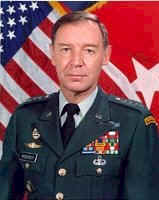
Frederick Woerner |
|
Worthington,
Colonel Wayne
(Army-retired) -- In
Southern Command J-2 Directorate as a major (1969-1972), first on
the Commander in Chief briefing team in the tunnel and then on the
Intelligence team that
produced the Country Intelligence Studies CIS. Assignments after
Panama were the G2 for the 2nd Infantry Division; student
at the Command and General Staff College; Director of Military
Officer Advance Course at Fort Huachuca and battalion commander;
student at the Army War College; Chief of Military Intelligence
Branch, Army Military Personnel Center; and Chief of Intelligence
Systems Integration at Department of the Army.
|
|
| WANT TO BE ADDED TO
THIS ROSTER? |
|
VISIT ALSO: |
| Send WHO
details of career assignment(s) after assignment in
Panama |
|
ASSIGNMENT PANAMA |
| This
page last updated: December
27, 2008 |
 |
| Site
developed, owned and maintained by |
| William
H. Ormsbee, Jr. |
| 1999-2001
/ 2002-2009 |
|